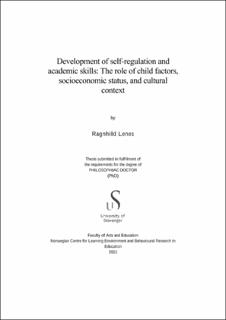| dc.contributor.author | Lenes, Ragnhild | |
| dc.date.accessioned | 2021-11-04T11:53:46Z | |
| dc.date.available | 2021-11-04T11:53:46Z | |
| dc.date.issued | 2021-11 | |
| dc.identifier.citation | Development of self-regulation and academic skills: The role of child factors, socioeconomic status, and cultural context by Ragnhild Lenes, Stavanger : University of Stavanger, 2021 (PhD thesis UiS, no. 611) | en_US |
| dc.identifier.isbn | 978-82-8439-040-6 | |
| dc.identifier.issn | 1890-1387 | |
| dc.identifier.uri | https://hdl.handle.net/11250/2827864 | |
| dc.description.abstract | Early childhood is a period of rapid learning and development, and research has made us increasingly aware of how crucial children’s early experiences are both for their current well-being and for their future adjustment, well-being, and academic achievement. The present thesis investigates the role of child gender and self-regulation, family socioeconomic status (SES), and cultural context for predicting children’s academic skills and self-regulation. It includes three studies, which all rely on data from a Norwegian research project. One of them — a comparative study—also relies on data from research conducted in the United States (U.S.).
The thesis had four overarching goals across the three studies. The first goal was to investigate the direct and indirect pathways from early selfregulation to fifth-grade academic achievement (Study II). The results showed that Norwegian children’s early self-regulation was foundational for their later reading comprehension and mathematical achievement. The second goal was to investigate the role of child gender for predicting early-childhood academic skills (Study I) and self-regulation (Study III). Results revealed small gender differences (favoring girls) in mathematical skills and self-regulation in the spring of the last year of Early Childhood Education and Care (ECEC) among Norwegian children, but no such differences in vocabulary. There were no gender effects on the change in vocabulary and mathematical skills to the spring of first grade. The third goal was to examine the role of family SES (maternal education) for predicting children’s early-childhood academic skills (Study I) and self-regulation Study III). The results showed SESrelated differences in Norwegian children’s vocabulary and mathematical skills in ECEC but not in their self-regulation. Further, the change seen in academic skills from ECEC to first grade was not affected by SES. Finally, the fourth goal was to study levels of early-childhood self-regulation and the role of maternal education and child gender for predicting self-regulation in Norway and the United States (Study III). Findings showed that children’s average level of self-regulation did not differ significantly across the two samples. Norwegian girls did have higher self-regulation scores than boys while there were no such gender differences in the U.S. sample, but this difference between the samples was not significant. However, maternal education significantly predicted U.S. children’s self-regulation but not that of Norwegian children, and this difference was significant across the samples.
The results are interpreted in light of the Bioecological Model of Development, previous evidence, and the social contexts from which the samples derive. Implications, especially for Norwegian ECEC, have been thoroughly discussed. The present thesis highlights the importance of conducting studies across groups and cultural contexts to understand the complexity of child development. Moreover, it emphasizes the importance of bringing self-regulation as a concept into Norwegian ECEC. In research and practice across the world, self-regulation is seen as foundational for early-childhood learning and development, but this concept is not even mentioned in the Norwegian framework plan for ECEC, which may affect pedagogical practices negatively.
The international literature on these topics is considerable, but this thesis contributes to our knowledge by investigating self-regulation in a Norwegian cultural and educational context. In addition, it has a longitudinal design that enables examination of long-term direct and indirect associations between early self-regulation and later academic achievement. This thesis also contributes by investigating the role of child gender and SES for predicting academic skills across two different educational contexts, namely the play-based ECEC and the structured first-grade classroom. Finally, this thesis includes a comparative study, which sheds light on the importance of conducting studies across cultural contexts, given that results from one context may not be valid for another. | en_US |
| dc.language.iso | eng | en_US |
| dc.publisher | Stavanger, University of Stavanger | en_US |
| dc.relation.ispartofseries | PhD thesis UiS;611 | |
| dc.relation.haspart | Paper 1: Lenes, R., Størksen, I., McClelland M., & Idsøe, T. (2021). The role of mother’s education and child gender for children’s vocabulary and math skills in the transition from Early Childhood Education and Care to first grade in Norway. Manuscript accepted July 30, 2021. The Paper is provisionally scheduled for publication in European Early Childhood Education Research Journal, Volume 30 Issue 3, June 2022. This paper is not available in Brage due to copyright restrictions. | en_US |
| dc.relation.haspart | Paper 2: Lenes, R., McClelland, M. M., ten Braak, D., Idsøe, T., & Størksen, I. (2020). Direct and indirect pathways from children’s early selfregulation to academic achievement in fifth grade in Norway. Early Childhood Research Quarterly, 53, 612–624. doi: https://doi.org/10.1016/j.ecresq.2020.07.005 | en_US |
| dc.relation.haspart | Paper 3: Lenes, R., Gonzales, C. R., Størksen, I., & McClelland, M. M. (2020). Children’s Self-Regulation in Norway and the United States: The Role of Mother’s Education and Child Gender Across Cultural Contexts. Frontiers in Psychology, 11(2563). doi: https://doi.org/10.3389/fpsyg.2020.566208 | en_US |
| dc.subject | utdanningsvitenskap | en_US |
| dc.subject | sosioøkonomisk status | en_US |
| dc.subject | tidlig barndom | en_US |
| dc.subject | barns akademiske ferdigheter | en_US |
| dc.title | Development of self-regulation and academic skills: The role of child factors, socioeconomic status, and cultural context | en_US |
| dc.type | Doctoral thesis | en_US |
| dc.rights.holder | ©2021 Ragnhild Lenes | en_US |
| dc.subject.nsi | VDP::Samfunnsvitenskap: 200::Pedagogiske fag: 280 | en_US |
